- Home
- Philip Roth
The Professor of Desire Page 5
The Professor of Desire Read online
Page 5
More youthful possibilities. In Paris, in a bar not far from the Bastille, where the infamous marquis had himself been punished for his vile and audacious crimes, a prostitute sits in a corner with us and, while she jokes with me in French about my crew cut, is busy stroking Birgitta beneath the table. In the midst of our excitement—for I also have a hand moving under the table—a man looms up, berating me for the indignities that I am making my young wife submit to. I rise with a throbbing heart to explain that we happen not to be husband and wife, that we are students, that what we do is our business—but, despite my excellent pronunciation and perfect grammatical constructions, he pulls a hammer out of his overalls, and raises it into the air. “Salaud!” he cries. “Espèce de con!” Hand in hand with Birgitta, and for the first time ever, I run for my life.
We do not discuss what will happen when the month is over. Rather, each thinks: Given what has been, what else can be? That is, I assume that I will return to America alone in order to resume my education, this time seriously, and Birgitta assumes that when I leave she will pack her knapsack and come with me. Birgitta’s parents have already been told that she is thinking of going to study next in America for a year, and apparently that is all right with them. Even if it weren’t, Birgitta would probably still do as she pleased.
When I rehearse the difficult conversation that must take place sooner or later, I hear myself sounding very limp and whiny indeed. Nothing I can say comes out right, nothing she can say sounds wrong—and yet it is I, of course, who invent the dialogue. “I am going to Stanford. I am going back to get my degree.” “So?” “I have terrible dreams about school, Gittan. Nothing like this has ever happened to me before. I fucked up my Fulbright but good.” “Yes?” “And, as for the two of us—” “Yes?” “Well, I don’t see that we have any future. Do you? I mean we would never be able to go back to ordinary sex. That can never work for us—we’ve upped the ante much too high. We’ve gone too far to go back.” “We have?” “I think so, yes.” “But it wasn’t my idea alone, you know.” “I didn’t say that it was.” “So then we stop going too far.” “But we can’t. Oh, come on, you know that.” “But I do whatever you want.” “That’s not possible any longer. Or are you saying that I’ve had you in my power all along, that you’re another Elisabeth I’ve corrupted?” She smiles her fetching buck-toothed smile. “Who then is the other Elisabeth?” she asks. “You? Oh, but that is not so. You say so yourself. You are a whoremaster by nature, you are a polygamist by nature, there is even the rapist in you—” “Well, maybe I’ve changed my mind about all that; maybe I was foolish to say such things.” “But how can you change your mind about what is your nature?” she asks.
In reality, going home to resume my serious education hardly requires that I fight my way, a little helplessly, a little foolishly, through this thicket of flattering objections. No, no challenging debate about my “nature” is necessary for me to be free of her and our fantastical life of thrilling pleasures—at least not right then and there. We are undressing for bed in a room we have rented for the night in a town in the Seine Valley, some thirty kilometers from Rouen, where I intend the next day to visit Flaubert’s birthplace, when Birgitta begins to reminisce about the silly dreams that used to be awakened in her as a teenager by the name California: convertible cars, millionaires, James Dean— I interrupt: “I’m going to California by myself. I’m going by myself—on my own.”
Minutes later she is dressed again and her knapsack is ready for the road. My God, she is bolder even than I imagined! How many such girls can there be in the world? She dares to do everything, and yet she is as sane as I am. Sane, clever, courageous, self-possessed—and wildly lascivious! Just what I’ve always wanted. Why am I running away, then? In the name of what? More Arthurian legends and Icelandic sagas? Look, if I were to empty my pockets of Elisabeth’s letters and Elisabeth’s photographs—and empty my imagination of Elisabeth’s father—if I were to give myself completely over to what I have, to whom I am with, to what may actually be my nature—“Don’t be ridiculous,” I say, “where can you find a room at this hour? Oh, damn it, Gittan, I have to go to California alone! I’ve got to go back to school!”
In response, no tears, no anger, and no real scorn to speak of. Though not too much admiration for me as a shameless carnal force. She says from the door, “Why did I like you so much? You are such a boy,” and that is all there is to the discussion of my character, all, apparently, that her dignity requires or permits. Not the masterful young master of mistresses and whores, not the precocious dramatist of the satyric and the lewd, and something of a fledgling rapist too—no, merely “a boy.” And then gently, so very gently (for despite being a girl who moans when her hair is pulled and cries for more when her flesh is made to smart with a little pain, despite her Amazonian confidence in the darkest dives and the nerves of iron that she can display in the chancy hitchhiking world, aside from the stunning sense of inalienable right with which she does whatever she likes, that total immunity from remorse or self-doubt that mesmerizes me as much as anything, she is also courteous, respectful, and friendly, the perfectly brought-up child of a Stockholm physician and his wife), she closes the door after her so as not to awaken the family from whom we have rented our room.
Yes, easily as that do young Birgitta Svanström and young David Kepesh rid themselves of each other. Ridding himself of what he is by nature may be a more difficult task, however, since young Kepesh does not appear to be that clear, quite yet, as to what his nature is, exactly. He is awake all night wondering what he will do if Birgitta should steal back into the room before dawn; he wonders if he oughtn’t to get up and lock the door. Then when dawn arrives, when noon arrives, and she is nowhere to be found, neither in the town of Les Andelys nor in Rouen—not at the Grosse Horloge; not at the Cathedral; not at the birthplace of Flaubert or the spot where Joan of Arc went up in flames—he wonders if he will ever see the likes of her and their adventure again.
* * *
Helen Baird appears some years later, when I am in the final stretch of graduate studies in comparative literature and feeling triumphant about the determination I have mustered to complete the job. Out of boredom, restlessness, impatience, and a growing embarrassment that naggingly informs me I am too old to be sitting at a desk still being tested on what I know, I have come near to quitting the program just about every semester along the way. But now, with the end in sight, I utter my praises aloud while showering at the end of the day, thrilling myself with simple statements like “I did it” and “I stuck it out,” as though it is the Matterhorn I have had to climb in order to qualify for my orals. Following the year with Birgitta, I have come to realize that in order to achieve anything lasting, I am going to have to restrain a side of myself strongly susceptible to the most bewildering and debilitating sort of temptations, temptations that as long ago as that night outside Rouen I already recognized as inimical to my overall interests. For, far as I had gone with Birgitta, I knew how very easy it would have been for me to have gone further still—more than once, I remember the thrill it had given me imagining her with men other than myself, imagining her taking money to bring home in her pocket … But could I have gone on to that so easily? Actually have become Birgitta’s pimp? Well, whatever my talent may have been for that profession, graduate school has not exactly encouraged its development … Yes, when the battle appears to have been won, I am truly relieved by my ability to harness my good sense in behalf of a serious vocation—and not a little touched by my virtue. Then Helen appears to tell me, by example and in so many words, that I am sadly deluded and mistaken. Is it so as never to forget the charge that I marry her?
Hers is a different brand of heroism from what, at that time, I take mine to be—indeed, it strikes me as its antithesis. A year of U.S.C. at eighteen, and then she had run off with a journalist twice her age to Hong Kong, where he was already living with a wife and three children. Armed with startling good looks, a brave front, and
a strongly romantic temperament, she had walked away from her homework and her boy friend and her weekly allowance and, without a word of apology or explanation to her stunned and mortified family (who thought for a week she had been kidnapped or killed), taken off after a destiny more exhilarating than sophomore year in the sorority house. A destiny that she had found—and only recently abandoned.
Just six months earlier, I learn, she had given up everyone and everything that she had gone in search of eight years before—all the pleasure and excitement of roaming among the antiquities and imbibing the exotica of gorgeous places alluringly unknown—to come back to California and begin life anew. “I hope I never again have to live through a year like this last one” is nearly the first thing she says to me the night we meet at a party given by the wealthy young sponsors of a new San Francisco magazine “of the arts.” I find Helen ready to tell her story without a trace of shyness; but then I had not been shy myself, once we’d been introduced, about meandering away from the girl I’d arrived with, and hunting her down through the hundreds of people milling around in the town house. “Why?” I ask her—the first of the whys and whens and hows she will be obliged to answer for me—“What’s the year been like for you? What went wrong?” “Well, for one thing, I haven’t been anywhere for six months at a stretch since I did my time as a coed.” “Why did you come back, then?” “Men. Love. It all got out of hand.” Instantly I am ready to attribute her “candor” to a popular-magazine mentality—and a predilection for promiscuity, pure and simple. Oh, God, I think, so beautiful, and so corny. It seems from the stories she goes on to tell me that she has been in fifty passionate affairs already—aboard fifty schooners already, sailing the China Sea with men who ply her with antique jewelry and are married to somebody else. “Look,” she says, having sized up how I seem to have sized up such an existence, “what do you have against passion anyway? Why the studied detachment, Mr. Kepesh? You want to know who I am—well, I’m telling you.” “It’s quite a saga,” I say. She asks, with a smile, “Why shouldn’t it be? Better a ‘saga’ than a lot of other things I can think of. Come now, what do you have against passion anyway? What harm has it ever done you? Or should I ask, what good?” “The question right now is what it has or hasn’t done for you.” “Fine things. Wonderful things. God knows, nothing I’m ashamed of.” “Then why are you here and not there, being impassioned?” “Because,” Helen answers, and without any irony at all for protection—which may be what makes me begin to surrender some of my own, and to see that she is not only stunning-looking, she is also real, and here with me, and maybe even mine if I should want her—“Because,” she tells me, “I’m getting on.”
At twenty-six, getting on. Whereas the twenty-four-year-old Ph.D. candidate who is my date for the evening—and who eventually leaves the party in a huff, without me—had been saying on the way over that, sorting her index cards in the library just that afternoon, she had been wondering if and when her life would ever get underway.
I ask Helen what it was like to come back. We have left the party by now and are across from one another in a nearby bar. Less passively than I, she has given the slip to the companion with whom she started the evening. If I want her … but do I? Should I? Let me hear first what it had been like coming back from running away. For me, of course, there had been far more relief than letdown, and I had been adrift for only a year. “Oh, I signed an armistice with my poor mother, and my kid sisters followed me around like a movie star. The rest of the family gaped. Nice Republican girls didn’t do what I did. Except that seems to be all I ever met everywhere I went, from Nepal to Singapore. There’s a small army of us out there, you know. I’d say half the girls who fly out of Rangoon on that crate that goes to Mandalay are generally from Shaker Heights.” “And now what do you do?” “Well, first I have to figure out some way to stop crying. I cried every day I was back for the first few months. Now that seems to be over, but, frankly, from the way I feel when I wake up in the morning I might as well be in tears. It’s that it was all so beautiful. Living in all that loveliness—it was overwhelming. I never stopped being thrilled. I got to Angkor every single spring, and in Thailand we would fly from Bangkok up to Chiengmai with a prince who owned elephants. You should have seen him with all his elephants. A nut-colored little old man moving like a spider in a herd of the most enormous animals. You could have wrapped him twice around in one of their ears. They were all screaming at one another, but he just walked along, unfazed. You probably think seeing that is, well, seeing only that. Well, that isn’t what I thought. I thought, ‘This is what it is.’ I used to go down in the sailboat—this is in Hong Kong—to get my friend from work at the end of the day. He sailed with the boat boy to work in the morning and then at night we sailed home together, right down between the junks and the U.S. destroyers.” “The good colonial life. It isn’t for nothing they hate giving up those empires. But I still don’t understand precisely why you gave up yours.”
And in the weeks that follow I continue to find it hard to believe—despite the tiny ivory Buddhas, the jade carvings, and the row of rooster-shaped opium weights that are arranged by her bedside table—that this way of life ever really was hers. Chiengmai, Rangoon, Singapore, Mandalay … why not Jupiter, why not Mars? To be sure, I know these places exist beyond the Rand McNally map on which I trace the course of her adventures (as once I traced down an adventure of Birgitta’s in the London phone directory), and the novels of Conrad where I first encountered them—and so, of course, do I know that “characters” live and breathe who choose to make their destiny in the stranger cities of the world … What then fails to persuade me completely that living, breathing Helen is one of them? My being with her? Is the unbelievable character Helen in her diamond-stud earrings or is it the dutiful graduate teaching assistant in his wash-and-dry seersucker suit?
I even become somewhat suspicious and critical of her serene, womanly beauty, or rather, of the regard in which she seems to hold her eyes, her nose, her throat, her breasts, her hips, her legs—why, even her feet would seem to her to have charming little glories to be extolled. How does she come by this regal bearing anyway, this aristocratic sense of herself that seems to derive almost entirely from the smoothness of skin, the length of limb, the breadth of mouth and span of eyes, and the fluting at the very tip of what she describes, without batting an eyelid (shadowed in the subtlest green), as her “Flemish” nose? I am not at all accustomed to someone who bears her beauty with such a sense of attainment and self-worth. My experience—running from the Syracuse undergraduates who did not want to “relate” to me “on that level,” to Birgitta Svanström, for whom flesh was very much there to be investigated for every last thrill—has been of young women who make no great fuss about their looks, or believe at least that it is not seemly to show that they do. True, Birgitta knew well enough that her hair cut short and carelessly nicely enhanced her charming furtiveness, but otherwise how she framed her unpainted face was not a subject to which she appeared to give much thought from one morning to the next. And Elisabeth, with an abundance of hair no less praiseworthy than Helen’s, simply brushed it straight down her back, letting it hang there as it had since she was six. To Helen, however, all that marvelous hair—closest in shading to the Irish setter—seems to be in the nature of a crown, or a spire, or a halo, there not simply to adorn or embellish but to express, to symbolize. Perhaps it is only a measure of how narrow and cloistered my life has become—or perhaps it is in fact the true measure of a courtesanlike power that emanates from Helen’s sense of herself as an idolized object that might just as well have been carved of one hundred pounds of jade—but when she twists her hair up into a soft knot at the back of her head, and draws a black line above her lashes—above eyes in themselves no larger and no bluer than Elisabeth’s—when she dons a dozen bracelets and ties a fringed silk scarf around her hips like Carmen to go out to buy some oranges for breakfast, the effect is not lost upon me. Far from it. I have from the
start been overcome by physical beauty in women, but by Helen I am not just intrigued and aroused, I am also alarmed, and made deeply, deeply uncertain—utterly subjugated by the authority with which she claims and confirms and makes singular her loveliness, yet as suspicious as I can be of the prerogatives, of the place, thereby bestowed upon her in her own imagination. Hers seems to me sometimes such a banalized conception of self and experience, and yet, all the same, enthralling and full of fascination. For all I know, maybe she is right.
“How come,” I ask—still asking, still apparently very much hoping to expose what is fiction in this fabulous character she calls herself and in the Asiatic romance she claims for a past—“how come you gave up the good colonial life, Helen?” “I had to.” “Because the inheritance money had made you independent?” “It’s six thousand lousy dollars a year, David. Why, I believe even ascetic college teachers make that much.” “I only meant that you might have decided youth and beauty weren’t going to get you through indefinitely.” “Look, I was a kid, and school meant nothing to me, and my family was just like everyone else’s—sweet and boring and proper, and living lo these many years under a sheet of ice at 18 Fern Hill Manor Road. The only excitement came at mealtime. Every night when we got to dessert my father said, ‘Is that it?’ and my mother burst into tears. And so at the age of eighteen I met a grown man, and he was marvelous-looking, and he knew how to talk, and he could teach me plenty, and he knew what I was all about, which nobody else seemed to know at all, and he had wonderful elegant ways, and wasn’t really a brutal tyrant, as tyrants go; and I fell in love with him—yes, in two weeks; it happens and not just to schoolgirls, either—and he said, ‘Why don’t you come back with me?’ and I said yes—and I went.” “In a ‘crate’?” “Not that time. Paté over the Pacific and fellatio in the first-class john. Let me tell you, the first six months weren’t a picnic. I’m not in mourning over that. You see, I was just a nicely brought-up kid from Pasadena, that’s all, really, in her tartan skirt and her loafers—my friends children were nearly as old as I was. Oh, splendidly neurotic, but practically my age. I couldn’t even learn to eat with chopsticks, I was so scared. I remember one night, my first big opium party, I somehow wound up in a limousine with four of the wildest pansies—four Englishmen, dressed in gowns and gold slippers. I couldn’t stop laughing. ‘It’s surreal,’ I kept saying, ‘it’s surreal,’ until the plumpest of them looked down his lorgnette at me and said, ‘Of course it’s surreal, dear, you’re nineteen.’” “But you came back. Why?” “I can’t go into that.” “Who was the man?” “Oh, you are becoming a cum laude student of real life, David.” “Wrong. Learned it all at Tolstoy’s feet.”

 American Pastoral
American Pastoral The plot against America
The plot against America The Human Stain
The Human Stain Nemesis n-4
Nemesis n-4 Sabbath’s Theater
Sabbath’s Theater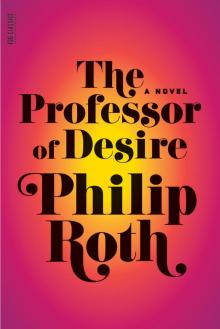 The Professor of Desire
The Professor of Desire Our Gang
Our Gang The Breast
The Breast Operation Shylock
Operation Shylock The Dying Animal
The Dying Animal Letting Go
Letting Go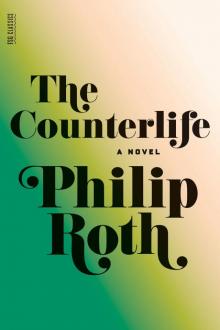 The Counterlife
The Counterlife Everyman
Everyman Nemesis
Nemesis Exit Ghost
Exit Ghost Portnoy's Complaint
Portnoy's Complaint My Life as a Man
My Life as a Man I Married a Communist
I Married a Communist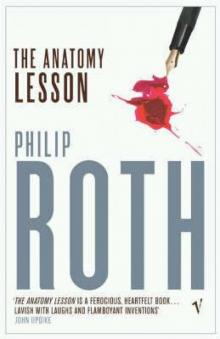 The Anatomy Lesson
The Anatomy Lesson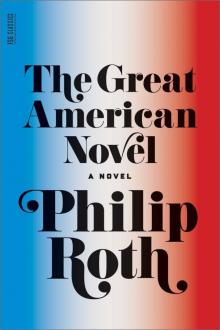 The Great American Novel
The Great American Novel Shop Talk
Shop Talk The Humbling
The Humbling Zuckerman Unbound
Zuckerman Unbound When She Was Good
When She Was Good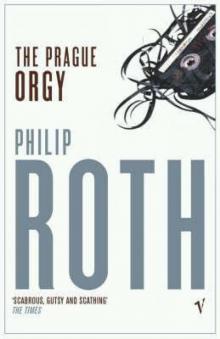 The Prague Orgy
The Prague Orgy American Pastoral (Nathan Zuckerman)
American Pastoral (Nathan Zuckerman) Goodbye, Columbus
Goodbye, Columbus Reading Myself and Others
Reading Myself and Others